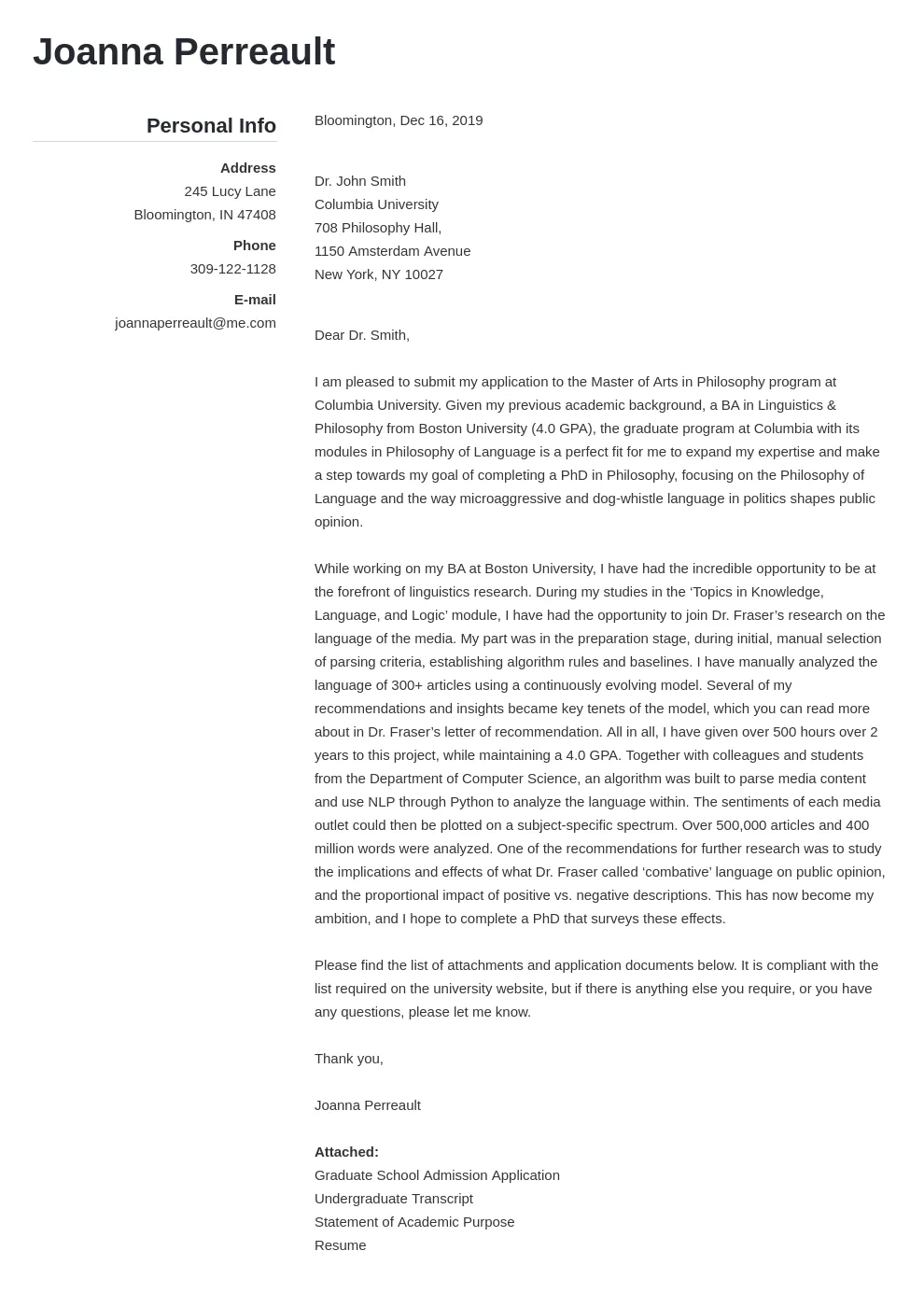Why You Need a Strong Graduate School Cover Letter
A compelling graduate school cover letter is your first opportunity to make a strong impression on the admissions committee. It’s more than just a formality; it’s a crucial tool for showcasing your personality, academic background, and aspirations. Unlike your resume, which presents a factual overview of your experience, the cover letter allows you to weave a narrative that connects your past experiences with your future goals. This is your chance to explain why you’re the ideal candidate for their program, highlighting your unique qualities and demonstrating your genuine interest in their specific research areas and faculty. A well-crafted letter can significantly increase your chances of acceptance, setting you apart from other applicants with similar qualifications and making a compelling case for why you deserve a place in their prestigious institution. Remember, the cover letter is an integral part of your application; treat it as such and invest the necessary time and effort to make it shine. See Cover Letter Examples Graduate School: graduate-school-cover-letter.webp
Highlighting Your Academic Achievements
Your academic achievements form the foundation of your application. The cover letter provides an ideal platform to elaborate on your academic successes. Instead of merely listing your GPA and honors, delve deeper. Explain the significance of your academic performance, especially if there are any areas you’d like to clarify. Did you overcome significant challenges? Did you excel in a particular subject relevant to your target program? Use this space to highlight any awards, scholarships, or recognition you received. Furthermore, provide specific examples of projects, research papers, or presentations that showcase your intellectual curiosity and analytical skills. Quantify your accomplishments whenever possible; for instance, mention the percentage of students you were ranked against or the impact of your research. By thoughtfully presenting your academic achievements, you’ll demonstrate to the admissions committee that you are a capable and driven individual ready to tackle the rigors of graduate-level study. Refer to Cover Letter Examples Graduate School: academic-achievements.webp.
Showcasing Relevant Skills
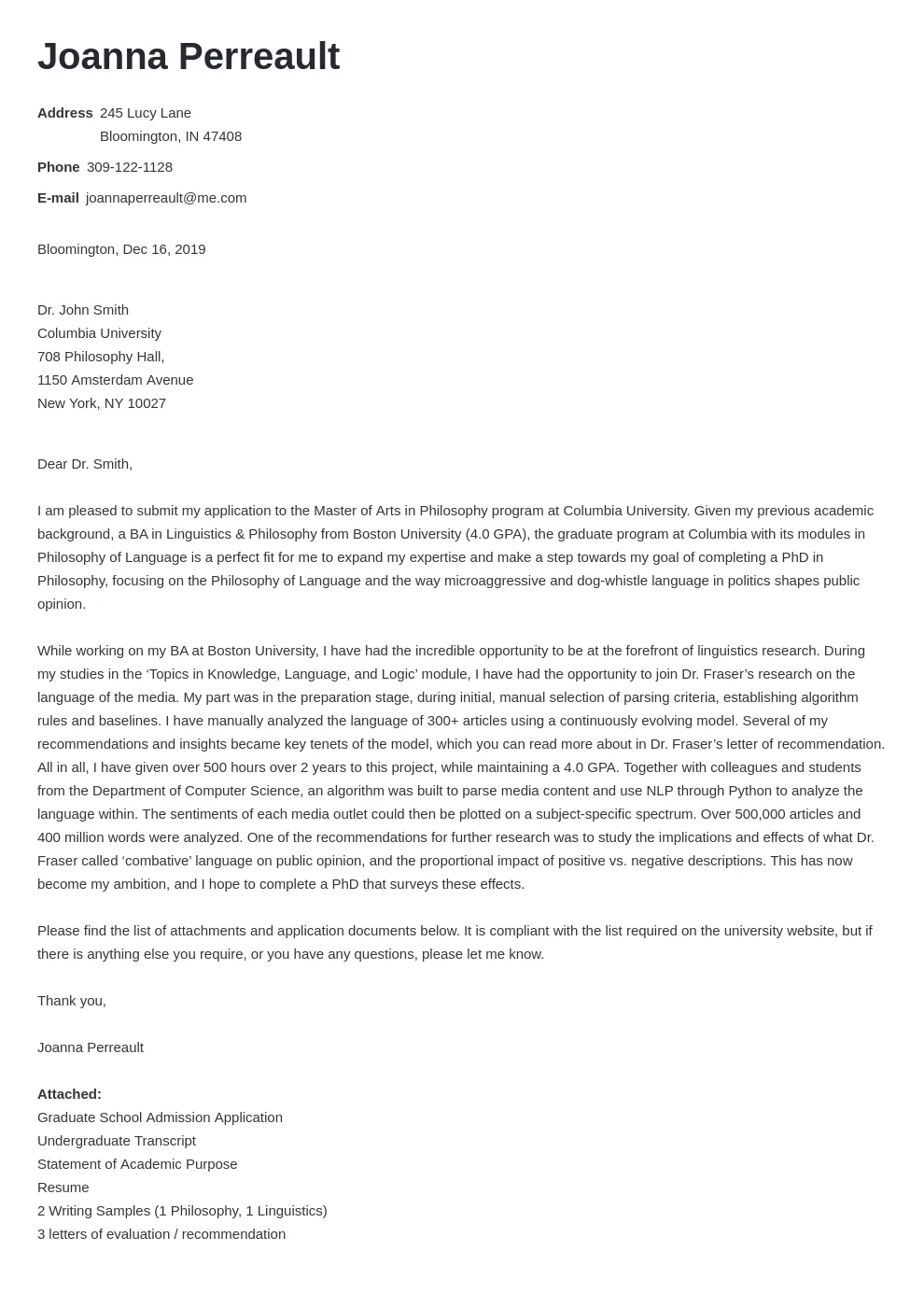
Beyond your academic record, the cover letter is an opportunity to highlight the skills you’ve developed that are relevant to your field of study. Consider the skills that are essential for success in your chosen graduate program and discuss how you’ve acquired and utilized these skills in your previous experiences. These skills can be both technical and soft skills. For example, if you’re applying for a research-based program, emphasize your analytical abilities, data analysis skills, and proficiency in research methodologies. If you’re applying to a program that involves teamwork, highlight your ability to collaborate effectively, communicate clearly, and contribute positively to group projects. Give specific examples of situations where you have successfully applied these skills. This may include describing a project where you demonstrated your problem-solving capabilities, or an instance where your communication skills helped to resolve a conflict or achieve a common goal. See Cover Letter Examples Graduate School: relevant-skills.webp.
Demonstrating Your Research Experience
For many graduate programs, particularly those in the sciences and humanities, research experience is critical. Your cover letter should clearly articulate your research involvement, including any research projects you’ve participated in, your role in these projects, and the outcomes you achieved. Be specific about the research methodologies you used, the data you collected and analyzed, and the findings you contributed. If you have presented your research at conferences or published any papers, be sure to mention this, including details about the publication or presentation. Also, explain why this research experience is important to your application and how it has prepared you for graduate-level studies. If you haven’t had extensive research experience, highlight any projects, coursework, or independent studies that have exposed you to research principles. This will demonstrate your capacity to engage in scholarly research and show the admissions committee that you are prepared to take on research responsibilities. Refer to Cover Letter Examples Graduate School: research-experience.webp
Structuring Your Graduate School Cover Letter
Structuring your graduate school cover letter is just as important as its content. A well-organized letter is easier to read, more persuasive, and reflects your professionalism. Start with a clear and concise introduction, followed by body paragraphs that address the key aspects of your qualifications. Conclude with a strong closing statement that reiterates your interest and enthusiasm for the program. Maintain a formal tone throughout the letter, using proper grammar and avoiding jargon. Ensure your letter is well-formatted, with a consistent font, clear headings, and sufficient white space for readability. Adhere to any specific formatting guidelines provided by the university or program. A structured letter will effectively communicate your message and leave a positive lasting impression on the admissions committee. Remember, this structure makes your application more approachable and helps the reader follow your arguments and understand the value you bring. See Cover Letter Examples Graduate School: cover-letter-structure.webp
Opening Paragraph
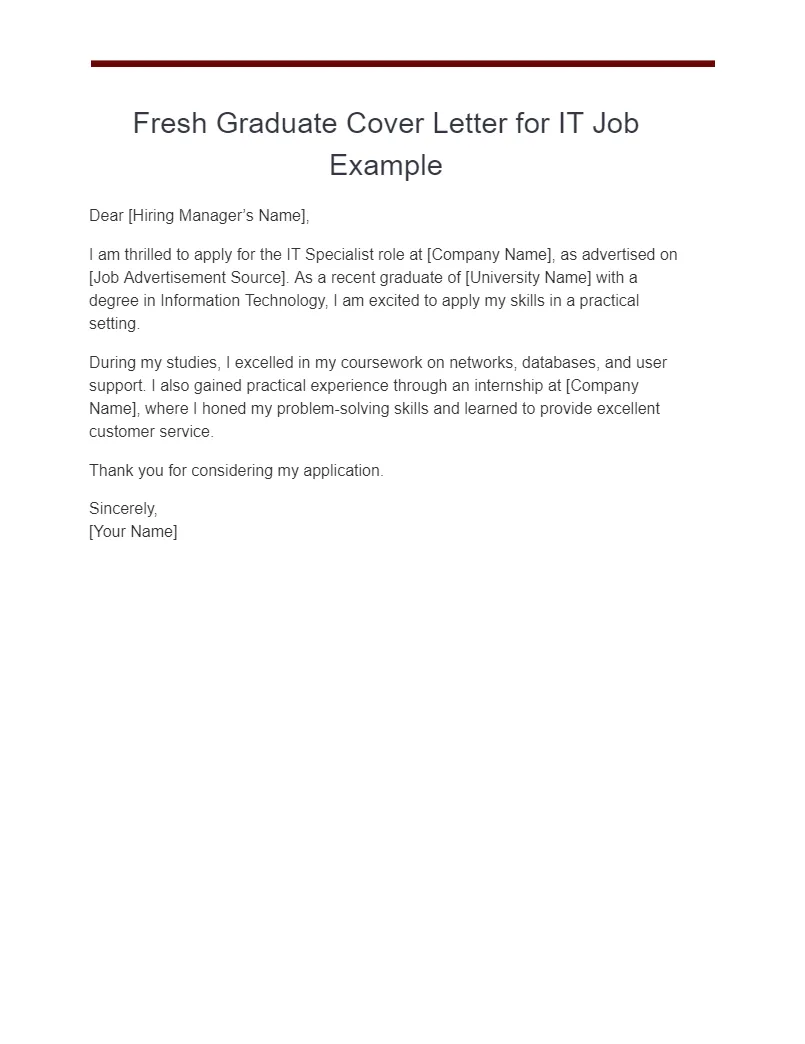
The opening paragraph is your first chance to capture the attention of the admissions committee and set the tone for your application. Begin by clearly stating the program you’re applying to and where you found the information. Briefly introduce yourself and your background, highlighting the aspect of your experience that aligns perfectly with the program’s focus. Indicate your sincere interest in the program and mention what initially drew you to it. This is also the place to state why you’re excited to apply and what you hope to achieve if admitted. Demonstrate your enthusiasm and knowledge of the program from the start. The opening is where you should create a compelling hook that grabs the reader’s interest and encourages them to continue reading. Avoid generic openings; personalize your message to show your passion for your chosen field. The opening needs to demonstrate your knowledge and make a great first impression.
Body Paragraphs
The body paragraphs should provide a detailed explanation of your qualifications. Each paragraph should address a specific aspect of your profile, such as your academic achievements, relevant skills, and research experience. Support your claims with specific examples, using the STAR method (Situation, Task, Action, Result) to describe your experiences. For instance, discuss a research project (Situation) where you were assigned the task of analyzing data (Task). You implemented a new statistical method (Action) and the research yielded a significant finding (Result). Connect your qualifications to the program’s requirements and explain how your experiences have prepared you for graduate-level studies. Refer to the program’s mission and values, and explain how your goals align. This detailed approach shows the admissions committee that you understand the program and are a good fit. Each body paragraph should clearly showcase your potential to succeed in the graduate program.
Closing Paragraph
The closing paragraph is the final impression you’ll make on the admissions committee. Summarize your key qualifications and reiterate your enthusiasm for the program. State your clear understanding of the program and the specific skills and knowledge you hope to gain by attending. Express your gratitude for the opportunity to apply, and thank the committee for considering your application. Reiterate your commitment to the program and highlight your eagerness to contribute to the academic community. Clearly state your availability for an interview and include your contact information. Finish the letter with a professional closing such as “Sincerely” or “Best regards,” and your full name. This final impression is an excellent opportunity to leave the admissions committee with a lasting positive impression of you and your qualifications.
Key Elements of a Winning Cover Letter
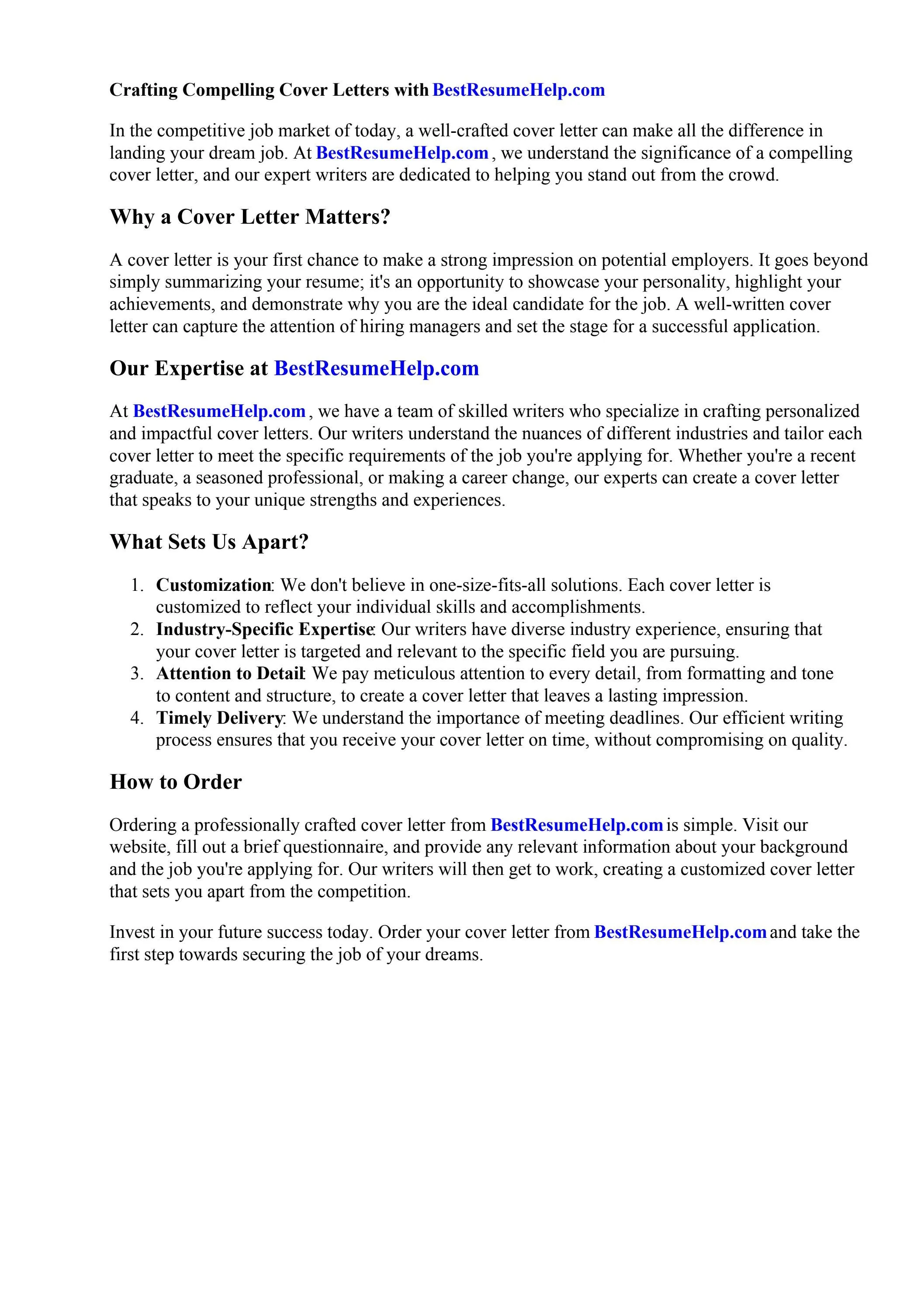
A winning cover letter should possess several key elements that will make it stand out. It should be tailored to the specific program and highlight how your background and experience align with the program’s objectives. Demonstrate your passion for the field and express a genuine interest in the specific research areas or faculty members you wish to work with. This will show that you’ve done your research and that you are serious about being a part of the program. Keep the tone professional, but let your personality shine through. Proofread and edit your cover letter meticulously to eliminate any grammatical errors or typos. Ensure the writing is clear, concise, and easy to understand. Make sure that the cover letter is well-formatted, making it easy to read. Present a clear and concise narrative that connects your past experiences to your future goals. Including all these elements in your cover letter will show the admissions committee that you are a suitable candidate. Refer to Cover Letter Examples Graduate School: program-tailoring.webp
Tailoring to the Specific Program
One of the most important elements of a winning cover letter is that it must be tailored to the specific program you’re applying to. Generic cover letters are easily identified and do not resonate with the admissions committee. Before you begin writing, thoroughly research the program, its faculty, and its specific areas of research. Carefully review the program’s mission statement and identify the keywords and values they emphasize. Use this information to customize your letter, highlighting how your experience and interests align with their focus. Mention specific faculty members whose research interests you and explain why you wish to work with them. Refer to specific courses, research opportunities, or program features that excite you. Tailoring your cover letter demonstrates that you’ve done your homework and are genuinely interested in attending their program. See Cover Letter Examples Graduate School: program-tailoring.webp
Expressing Your Passion
Passion is a driving force for success in graduate school, and it’s essential to convey your enthusiasm for your chosen field. The cover letter is the perfect place to communicate your excitement for the subject matter. Share the reasons you’ve chosen this particular field of study. What initially sparked your interest? What aspects of the field do you find most fascinating and engaging? Express your specific career goals and how the graduate program will help you achieve them. Talk about your research interests and why you’re drawn to specific faculty members or research projects. Mention any personal experiences or intellectual pursuits that have fueled your passion. The more genuine and enthusiastic you sound, the more likely the admissions committee will remember you. Passion also shows your commitment and drive to succeed. See Cover Letter Examples Graduate School: expressing-passion.webp
Proofreading and Editing
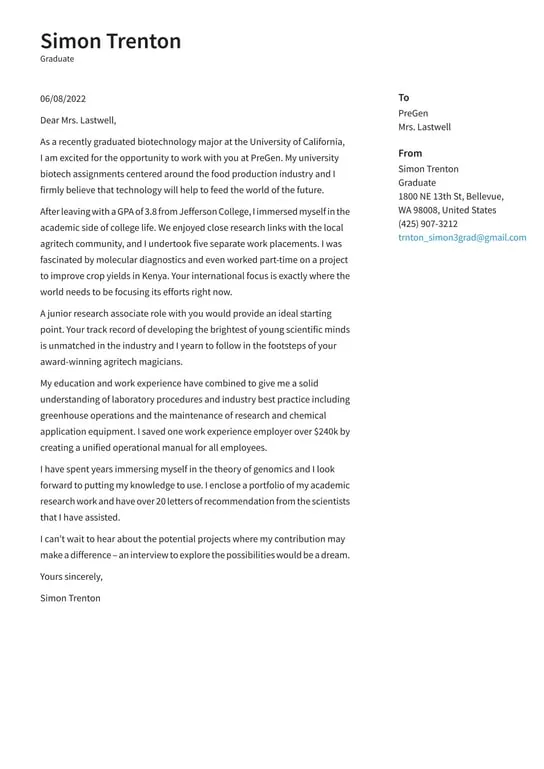
Proofreading and editing are crucial to ensure your cover letter is polished and professional. Errors in grammar, spelling, and punctuation can undermine your credibility. Review your letter multiple times, paying close attention to detail. It’s beneficial to let someone else review your letter as well, as a fresh set of eyes can often catch mistakes you might miss. Ensure that the language is clear, concise, and appropriate for an academic setting. Verify that your formatting is consistent throughout the letter. Check that the information is accurate and that your contact information is correct. Avoid using slang, jargon, or overly casual language. Proofread everything, including the header, salutation, and closing. A well-proofread cover letter reflects your attention to detail, professionalism, and commitment to excellence. Refer to Cover Letter Examples Graduate School: proofreading-editing.webp
Top Cover Letter Examples Graduate School
Reviewing examples of successful cover letters can provide valuable insights into what works and what doesn’t. These examples show various styles, formats, and approaches to cover letters. Consider these cover letters as inspiration and a guide for writing your own. Take note of how the applicants highlight their skills, experience, and passion, and how they tailor the letter to the specific program. Analyze the structure of the letters, the language used, and the overall tone. Remember, the best examples are not templates to be copied, but rather, they should be adapted to reflect your unique background and aspirations. Adapt these to your own needs, using them as inspiration and a basis for creating your own compelling cover letter.
Example Cover Letter 1
This example highlights strong academic qualifications and research experience. The applicant clearly explains their research interests and how they align with the program’s faculty. The letter includes a personalized touch, referring to specific projects and professors.
Example Cover Letter 2
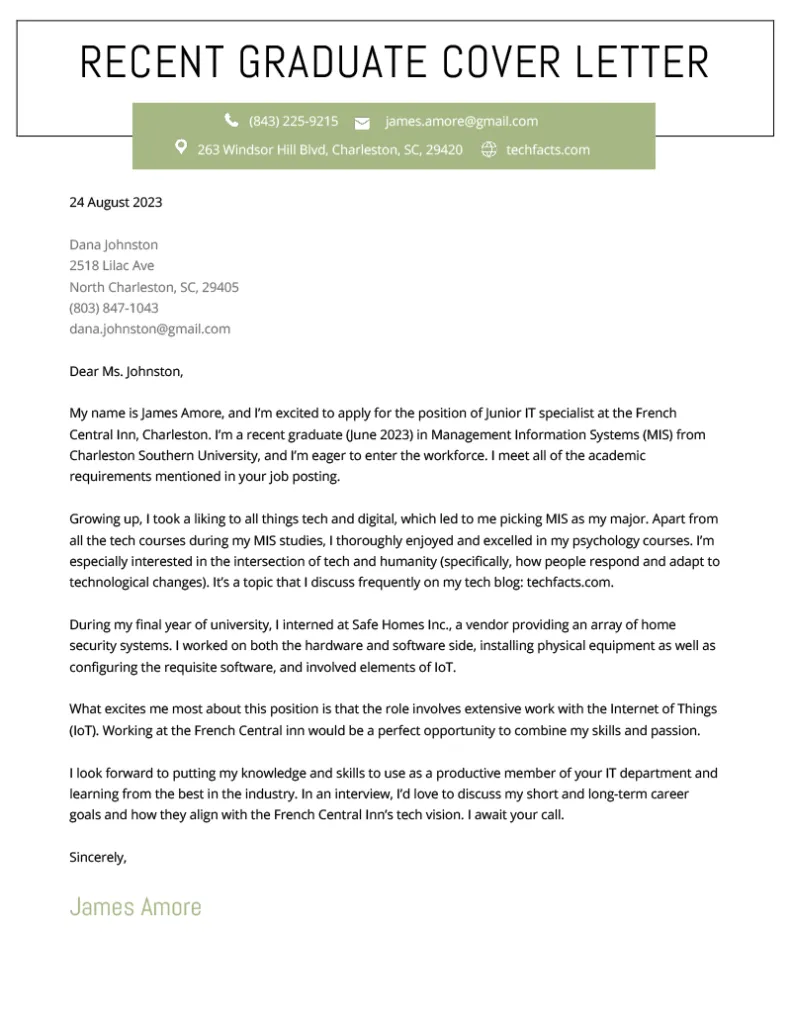
This example focuses on a candidate with unique professional experiences relevant to the program. The applicant illustrates how their skills and experience have prepared them for graduate study and how they will contribute to the program. The letter details specific projects and results achieved, demonstrating a strong commitment.
Example Cover Letter 3
This example showcases a candidate who changed careers and has a compelling narrative. The applicant explains their reasons for pursuing graduate study and their passion for the field. The letter emphasizes transferable skills and their potential for success in the program. The letter clearly connects their previous experiences and future goals, offering a cohesive narrative.
Common Mistakes to Avoid in Your Cover Letter
Avoiding common mistakes can significantly improve the quality of your cover letter and enhance your chances of acceptance. Some mistakes can cause your application to be rejected. Therefore, it’s important to be aware of these errors. Be sure to customize your cover letter for each program, as a generic letter that isn’t tailored is easily identified and may be rejected. Make sure to avoid errors and always proofread. Additionally, do not merely rehash your resume. Use the cover letter to tell your unique story and demonstrate why you are the ideal candidate. Being aware of these common mistakes will help you avoid these pitfalls and make your application more compelling.
Generic Language
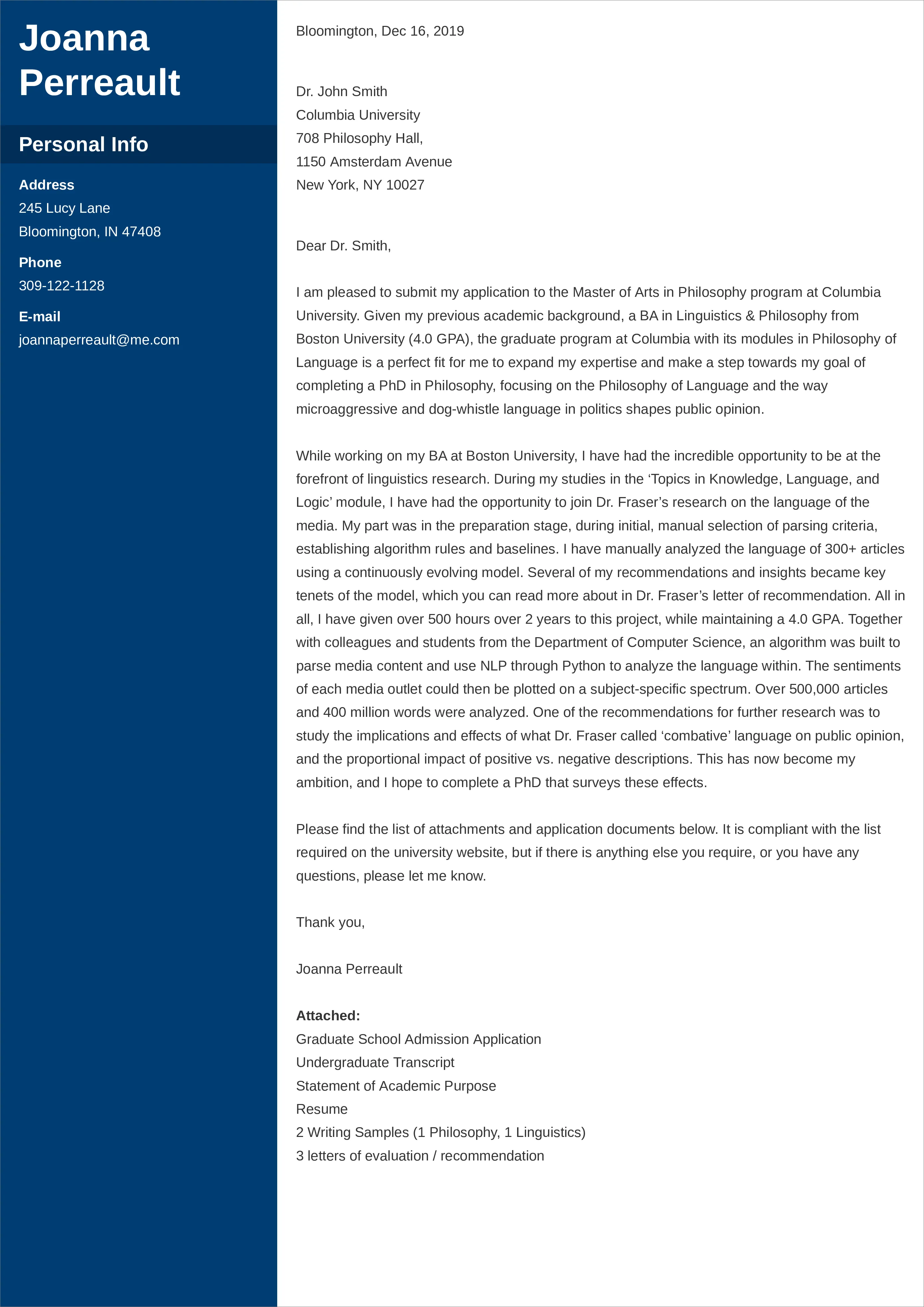
Using generic language is one of the most common mistakes. Avoid using clichés and vague statements. These statements do not resonate with the admissions committee. Instead, use specific, descriptive language to showcase your experiences and qualifications. Replace generic phrases with concrete examples that illustrate your achievements, skills, and passion for the field. Tailor your letter to the specific program by mentioning specific faculty members, research areas, or program features. Generic language makes it difficult for the admissions committee to understand your unique qualities. The more personalized and detailed your writing is, the more effectively your cover letter will convey your potential.
Focusing Solely on Yourself
While it is important to highlight your accomplishments, it is equally important to demonstrate your interest in the program and how you will contribute to the academic community. A cover letter should establish your interest in the program, showcasing how it will benefit you and how you plan to contribute to it. Mention specific faculty members, research projects, or courses you are excited about. Connect your goals with those of the program. Show the admissions committee why you are a good fit, not only for what you can gain from the program but also for what you can offer. Focusing excessively on yourself without acknowledging the program’s unique aspects can make your letter seem self-centered.
Ignoring Instructions
Carefully read and follow all instructions provided by the university or program. Instructions typically specify the format, content, and length of the cover letter. Not adhering to these instructions can signal a lack of attention to detail and a disregard for the program’s requirements. If the program requests specific information, make sure to include it. Also, make sure that you submit your application by the deadline. Ignoring instructions can lead to your application being rejected. Review the requirements and ensure that your cover letter meets all the criteria before submitting it. By paying close attention to these instructions, you show the admissions committee that you value details and are committed to the application process.
